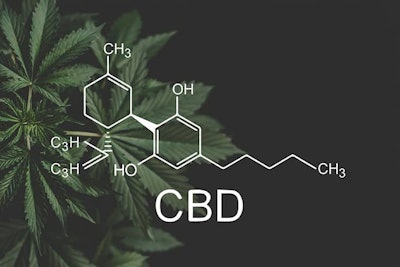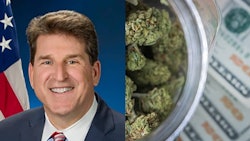
Several companies have been claiming that their CBD products can cure, treat, or prevent COVID-19, but the U.S. Food and Drug Administration (FDA) says they are wrong.
Seven companies—Cureganics, Heaven’s Organics LLC, Functional Remedies LLC, Greenway Herbal Products LLC, CBD Social, UPSY LLC and Nature’s Highway—received warning letters from the FDA in conjunction with the Federal Trade Commission (FTC) on March 28, according to a Miami Herald report.
The FDA and FTC are issuing warning letters to businesses that they say are “selling fraudulent products with claims to prevent, treat, mitigate, diagnose, or cure coronavirus disease 2019 (COVID-19),” according to the FDA’s website.
For example, in its letter to CBD Social, the FDA claims it “has observed that your website offers cannabidiol (CBD) products for sale in the United States and that these products are intended to mitigate, prevent, treat, diagnose, or cure COVID-19 in people. Based on our review, these products are unapproved new drugs sold in violation of section 505(a) of the Federal Food, Drug, and Cosmetic Act (FD&C Act), 21 U.S.C. § 355(a). Furthermore, these products are misbranded drugs under section 502 of the FD&C Act, 21 U.S.C. § 352. The introduction or delivery for introduction of these products into interstate commerce is prohibited under sections 301(a) and (d) of the FD&C Act, 21 U.S.C. § 331(a) and (d).”
The warning letter says that CBD Social cited studies on its website to “misleadingly represent” its products “as safe and/or effective for the treatment or prevention of COVID-19,” including a 2021 National Institute of Health (NIH) study, a 2022 University of Chicago study, and a 2022 study from the American Chemical Society and American Society of Pharmacognosy.
“We request that you take immediate action to cease the sale of any unapproved and unauthorized products for the mitigation, prevention, treatment, diagnosis, or cure of COVID-19,” the FDA wrote.
The FTC issued a “cease and desist” demand within the letter, adding that “it is unlawful under the FTC Act, 15 U.S.C. § 41 et seq., to advertise that a product can prevent, treat, or cure human disease unless you possess competent and reliable scientific evidence, including, when appropriate, well-controlled human clinical studies, substantiating that the claims are true at the time they are made. For COVID-19, no such study is currently known to exist for the products identified above. Thus, any coronavirus-related prevention or treatment claims regarding such products are not supported by competent and reliable scientific evidence. You must immediately cease making all such claims.”
The FDA is calling on the companies to revise their websites and product labels to eliminate the claims and says in its warning letters that “failure to adequately correct any violations may result in legal action, including, without limitation, seizure and injunction.”
Joy Beckerman, principal of Hemp Ace International, told Cannabis Business Times that the most recent batch of FDA warning letters to CBD companies is no different than the dozens of others that have been issued since February 2015, when the agency issued its first set of warning letters to human and animal CBD companies for making unapproved drug claims.
“It’s just the same old, same old,” Beckerman said.
The FDA has issued a total of 79 warning letters to CBD companies in the past seven years, according to its website.
A warning letter is not enforcement action, Beckerman said, but it does tend to force businesses to self-correct when they receive one.
“They do put people on notice and they keep folks on their toes, and those of us who are leading the industry with ethics and standards and quality … are, frankly, beating the drum of, listen, whether there is a regulatory framework specifically in place on CBD or any hemp-derived cannabinoids, regardless of that, there is most certainly an entire set of federal regulations for those engaged in any way in the food and beverage industry, in the dietary supplement industry, in the cosmetic industry, in the over-the-counter drug industry—whether that be topical or otherwise—and in the drug industry,” she said. “We all need to be following those laws, and these warning letters come out when most companies are not, but these are the ones that FDA feels are egregious.”
The reasons behind the warning letters have evolved over the years, Beckerman said; at first, the FDA issued warnings to companies based on false potency claims, when, for example, a company labeled a product as containing 25 mg of CBD but it in fact only contained 5 mg.
Then, in 2018, the FDA issued only one warning letter to Signature Formulations LLC, citing cGMP violations for the first time.
In 2020, the nature of the letters shifted again, this time to COVID-19 claims.
Beckerman said that the most recent batch of letters issued this week were likely spurred by companies basing their product claims on a January 2022 study by Oregon State University that found cannabigerolic acid (CBGA) and cannabidiolic acid (CBDA) showed the ability to prevent the virus that causes COVID-19 from entering human cells.
RELATED: Oregon State Research Shows Hemp Compounds Prevent Coronavirus From Entering Human Cells
“The research itself, for the sophisticated, good actors in the space, became a wonderful, educational opportunity to learn about what this stuff means,” Beckerman said. “But for the bad actors and for those who don’t care, … they started referencing this in their marketing materials and making drug claims, … and that’s why the FDA has come after them and has sent out those seven warning letters.”
Now, she said the companies will likely self-correct, and while the FDA does not always follow up, the agency will sometimes send a closeout letter once it completes an evaluation of the corrective actions taken by a company in response to a warning letter.
If, however, a company continues to violate the law after receiving a warning letter, the FDA could take additional action, Beckerman said.
“It’s an interesting balance or teeter totter that we’re on in that they’re not coming in and shutting an entire business down,” she said. “Now, if it were super egregious, like horrible, then they would have to. But clearly, they have not deemed that to be the case because, again, the majority of what happens here … is you get an FDA warning letter, you get … scared, … and then you self-correct."

























